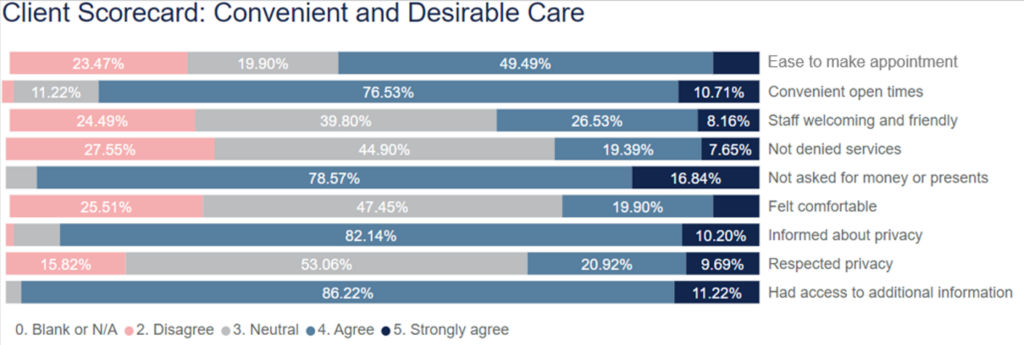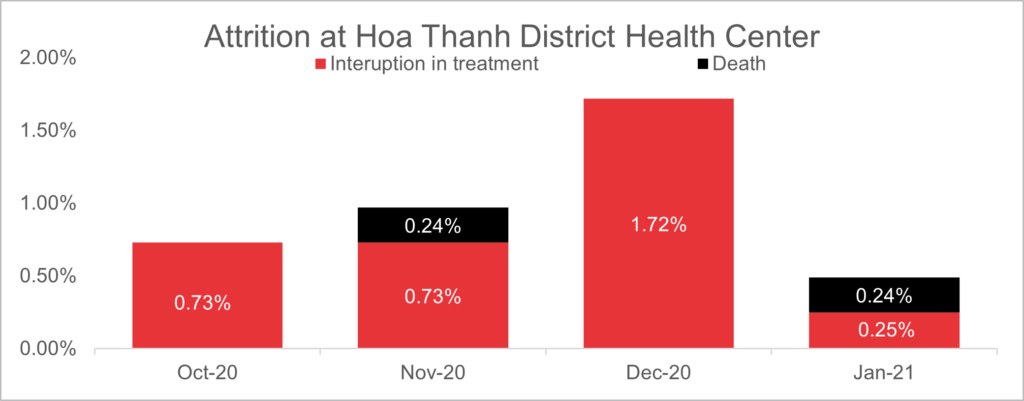Pham Thu Trang, Senior Technical Officer, CQI, EpiC Vietnam
Rachel S. Coley, Project Manager, EpiC Vietnam
For more than two decades, FHI 360 has worked with the Government of Vietnam and community partners to strengthen the health system’s ability to find, test, treat, and sustain treatment for people living with HIV. Today, Vietnam is taking on increased ownership of the financial and technical management of its HIV programs as international funders and organizations focus on transition and sustainability. Strengthening provincial capacity to evaluate performance, develop solutions to address gaps, and utilize community monitoring to ensure accountable and responsive services are key to these efforts. In August 2020, EpiC Vietnam launched a new model for continuous quality improvement (CQI) in two focal provinces. EpiC works alongside provincial leaders to formalize the process, integrate community voices in all conversations, standardize client feedback collection, and systematize performance data reviews.
CQI Response Teams
EpiC-supported CQI Response Teams involve five key stakeholder groups.
- Provincial CQI focal points include existing government staff that receive supplemental stipends to administrate CQI activities in the province. Activities include coordinating meetings, planning agendas, tracking actions, and supporting community feedback efforts.
- The Community Quality Improvement Committee is comprised of community health supporters who have experience working with people living with HIV and those at risk of HIV. This committee ensures that the needs and voices of clients are integrated into all evaluation and improvement activities.
- EpiC staff, including the CQI lead and team members, provide technical expertise relevant to each province’s CQI priorities.
- Provincial leaders serve as the sponsors of the group, work on policy-level interventions, and work to allocate provincial funds when necessary to address challenges.
- Site staff represent public health facilities in the province that receive project support. These individuals are usually tasked with implementing changes recommended by the response team along with the Community Quality Improvement Committee.
These Response Teams meet monthly to discuss project data and community feedback collected at all project-supported public health facilities. They evaluate results, identify issues, develop solutions, and quickly implement improvement measures. EpiC staff and the CQI focal point follow up on action items between meetings and coordinate technical assistance as needed.
Early results in Tay Ninh
Tay Ninh, a peri-urban province near Ho Chi Minh City, was the first to launch this approach. Since August 2020, the Response Team has reviewed nearly 3,000 community feedback surveys on performance at seven public facilities. EpiC Vietnam uses a feedback survey developed in partnership with government leaders and community partners. Clients have the option to complete the survey on paper at all sites, on electronic tablets at high-volume sites, or on their personal mobile device. As illustrated in Figure 1, these surveys illuminated numerous concerns at one site.

Community feedback served as an early warning of issues at the site, with subsequent program data reviews seeing increased levels of interruption in treatment (IIT). When clients face barriers to care, whether procedural, financial, or emotional, it can demotivate them to return to a site.
The Response Team immediately deployed a working group to visit the facility, discuss feedback, and jointly develop an improvement plan. Site leadership identified improvement measures to address staff attitudes with respect to key population clients, ensure computer literacy among the staff responsible for entering data into the health information system, and create mentoring relationships with the Tay Ninh Provincial General Hospital to improve referrals and clinical monitoring. Community feedback has already improved, with feedback results from January and February showing more positive responses to all questions and a decline in IIT rates (Figure 2).

The Response Team continues to monitor the site closely and work to strengthen the capacity of site staff to provide friendly, competent, and comprehensive services. EpiC staff have increased virtual and in-person technical assistance to ensure gains are not lost, and Response Team members monitor client feedback and remain attentive to any service concerns.
EpiC expands CQI efforts
EpiC is using a similar process to build CQI Response Teams in Tien Giang and Dong Nai, two other provinces near Ho Chi Minh City. These teams are using data to drive the decision-making process, improve links to treatment, enhance client privacy, and expand the friendliness of services at some of the country’s largest HIV treatment facilities. EpiC Vietnam plans to launch a CQI Response Team in one additional province this year and use community feedback forms at all HIV testing and treatment sites.
Photo Credit: EpiC Vietnam

